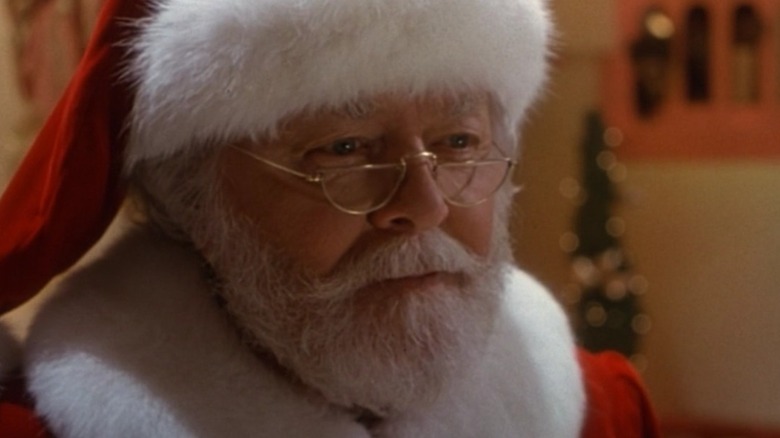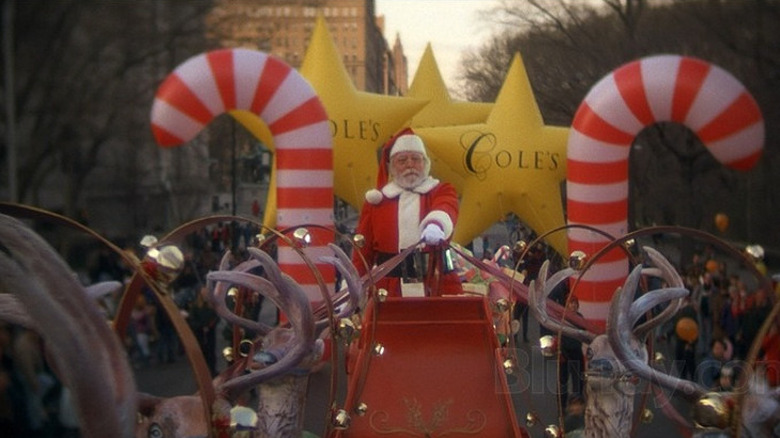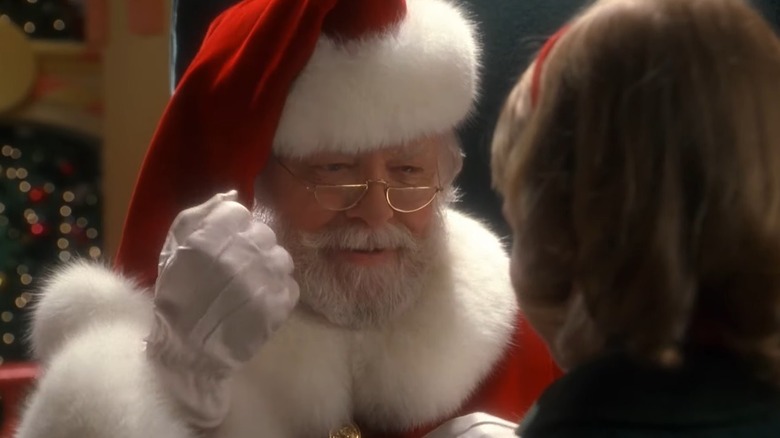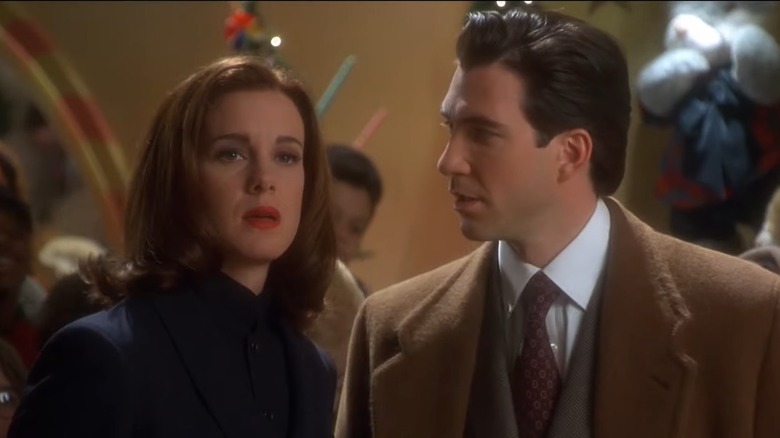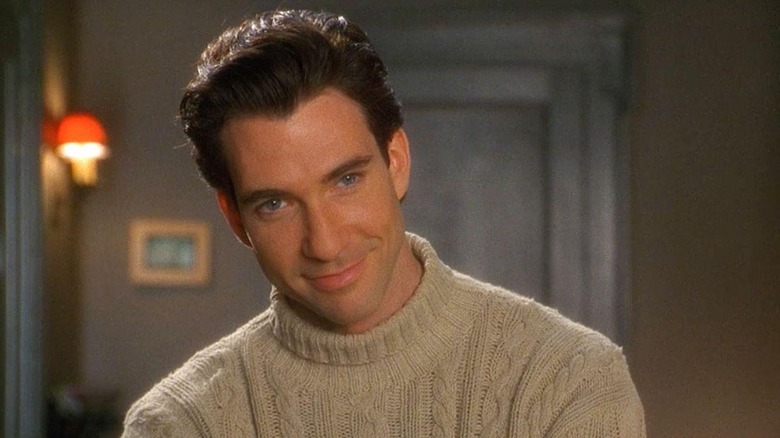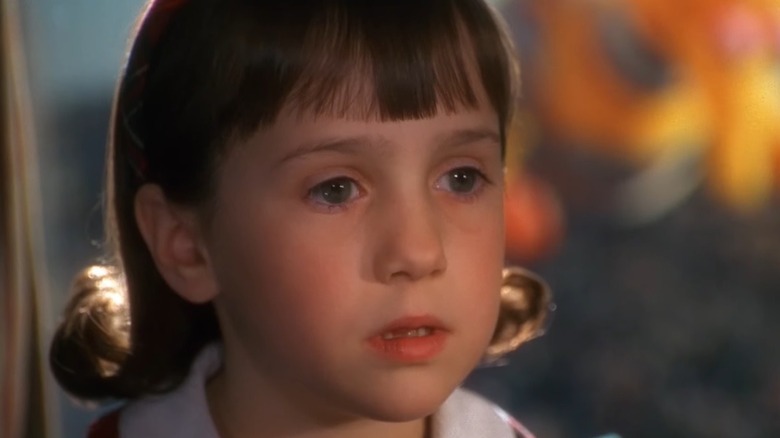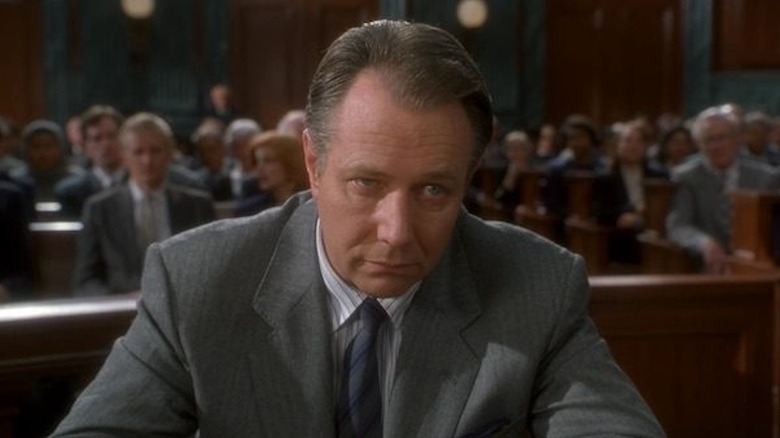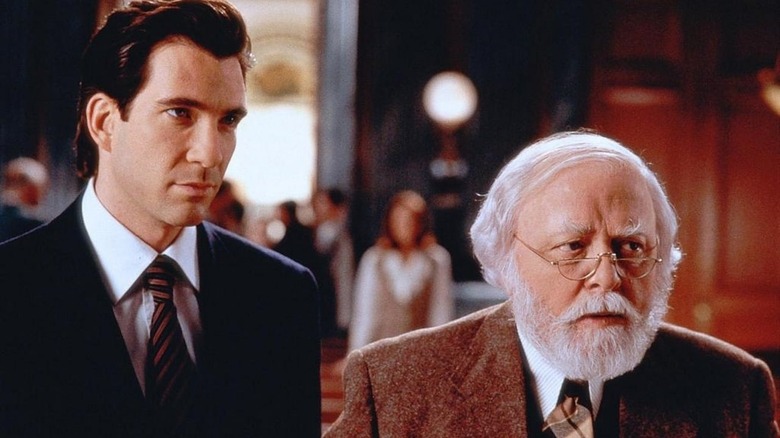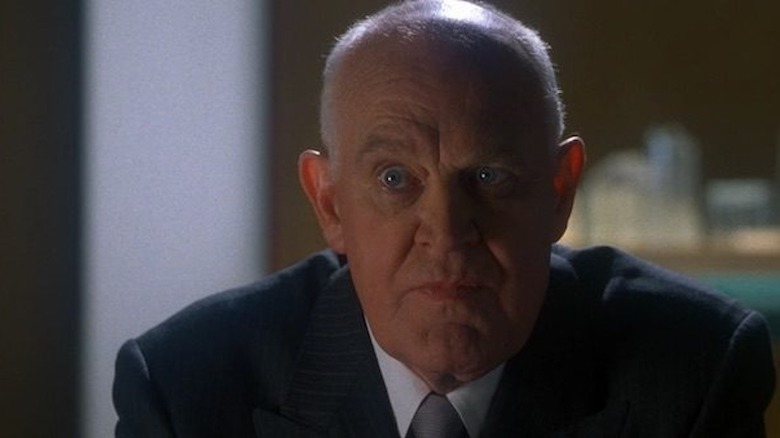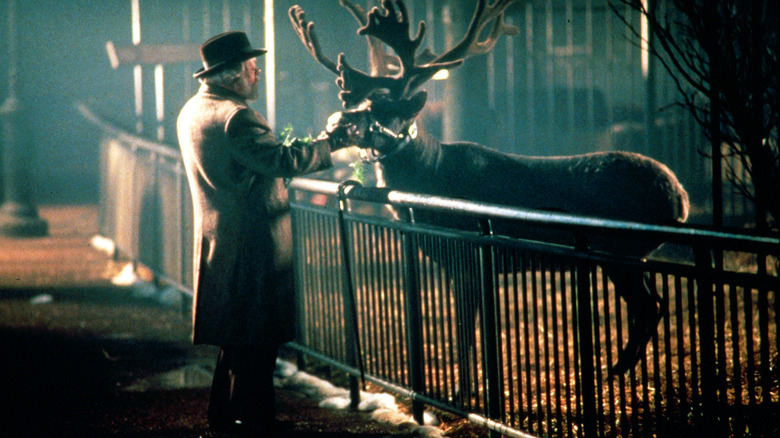Things Only Adults Notice In Miracle On 34th Street
In 1994, an update to a timeless holiday classic arrived in theaters. Thanks to some magical direction, clever scripting, and a talented main cast, it managed to become a Christmas classic in its own right. Based on the 1947 film of the same name, "Miracle on 34th Street" follows what happens when a kindly man who looks like Santa Claus takes the job of being Santa for New York's most famous department store, then has to prove to the world that he's the genuine article.
Similar to the original, "Miracle on 34th Street" is the kind of movie that the entire family can sit down and view together during the holiday season. However, while enjoyable for everyone, different family members will take different things from it. For the youngest people in the room, the film is proof of the magic of Santa Claus, a journey into the belief that miracles can happen at Christmas if you just have faith. For the adults, it might also be that, but there are plenty of other complications along the way. From the corporate war at the center of the film to the reality of Santa Claus, here are some things only adults notice in "Miracle on 34th Street."
The fictional department store
The 1994 version of "Miracle on 34th Street" is adapted from a previous holiday classic of the same name, released in 1947 and starring Maureen O'Hara, a very young Natalie Wood, and Edmund Gwenn in an Oscar-winning role as Kris Kringle. The original film, written and directed by George Seaton from a story by Valentine Davies, is set primarily within the 34th Street location of Macy's department store. This is why, along with their famous Macy's Thanksgiving Day Parade, the retailer remains a central fixture of New York City during the holidays.
Kids watching the film might not notice this, particularly if they haven't seen the original, but the Los Angeles Times explains that Macy's declined to participate in the 1994 "Miracle on 34th Street" update, leaving producers to come up with a fictional department store to step in. So, Macy's becomes Cole's in the '94 version, while rival store Gimbels, which shut down in the 1980s, as noted by The New York Times, becomes Shopper's Express. It's a relatively small change in terms of story, but one that makes a big difference if you remember the history of the original film.
The many faces of Kris Kringle
The central figure of "Miracle on 34th Street" is Kris Kringle (Richard Attenborough), a kindly man with a beard who takes the job of Santa Claus after confronting the previous Cole's Santa (Jack McGee) over drinking on the job. Once he's in place as Santa, Kris ignites a national phenomenon and eventually becomes embroiled over a legal case due to his claim that he is, in fact, the real Santa Claus.
Kids can clearly see this as the central conflict of the story, but for adults, there are more layers to the way Kris relates to the world around him and the people in it. In the very first scene, Kris laughs along with an older man about the possibility that he's Santa and then tells the kid standing next to him that he really is the famed gift giver. Here, Kris shows he is capable of being different things to different people, depending upon their level of belief.
With Bryan (Dylan McDermott), he most often behaves like a kind, well-intention old man who might be Santa, whereas with Dorey (Elizabeth Perkins) he's a bit more deliberate and direct, determined to convince her to believe in him. Meanwhile, with Susan (Mara Wilson), he's at turns sad that she doesn't believe in him and at other times bemused by her convictions. For a guy who seems determined to prove he's Santa, Kris is a surprisingly chameleonic figure in the film.
Dorey's pain
When we meet her, Dorey Walker is busy with the hustle and bustle of the holiday season kickoff at Cole's. As the store's special projects director, she's directly responsible for ensuring the store has a good Santa, and she lucks into one with Kris Kringle. However, it quickly becomes apparent that Dorey is not a Santa person. In fact, apart from her daughter Susan, she seems to treat just about everyone with a certain conditional civility, including her boyfriend, Bryan.
Dorey makes it clear that truth is the most important thing to her, even that commitment to truth involves telling her daughter that Santa isn't real. As the film goes on, it becomes clear that this pragmatic approach to human interaction carries with it some evident emotional scars. To kids, she's just a woman who's a little cold and doesn't believe in Santa. To adults who've lived through heartbreak of their own, she's a woman who was hurt so deeply that she's reluctant to ever let anyone other than Susan in ever again, and this informs a great deal of the film's plot.
Bryan's issues
Dorey Walker is a woman who has serious trouble trusting anyone. She doesn't go into too many specifics about her past, but it's very clear from various conversations throughout "Miracle on 34th Street" that she was hurt very badly. As a result, she's both very guarded and committed to honesty above all else, particularly when raising her daughter.
In contrast, her boyfriend Bryan seems like a very carefree, relaxed, fanciful guy who's interested in fun, make-believe, and emotional attachment. His personality often stands in direct opposition to Dorey's, which to the kids in the room makes him the fun one of the adults. However, the adults watching know that it's not all fun and games for Bryan, particularly where Dorey is concerned. His need to commit to her, and to seek commitment to her in return, seems to be part of some emotional issues of his own, which he's perhaps not yet willing to deal with. Whatever's going on there, his willingness to dive in headfirst with Dorey and Susan could mean he's been hurt in his own way, and this is how he deals with that.
Susan's maturity
Perhaps the most fascinating character in "Miracle on 34th Street" is Dorey's daughter, Susan. While Susan may only be six, she makes it quite clear to the adults in her life that she's aware Santa Claus is not real, even if that's a secret she's meant to keep from other kids. Thanks to her mother's parenting style, Susan is a very grown-up version of a six-year-old, one who talks about things like limiting her sugar intake and the logic of Santa Claus in a department store. We're meant to see her as a somewhat peculiar child, and the fellow children watching in the room probably catch on to that immediately.
As an adult, though, the more you watch "Miracle on 34th Street," the more you notice the genuine childlike qualities Susan has. She doesn't believe in Santa Claus, but she's fascinated by the fiction of TV shows and catalogs, along with the things they suggest her life could be. She's delighted by Mr. Kringle and even gets excited when she realizes his beard is real. Susan is mature for her age, yes, but there's still a certain childlike wonder within her that comes out at key moments in the film.
The corporate showdown
The central conflict of "Miracle on 34th Street" doesn't fully kick in until the second act, when a group of people starts trying to discredit Kris Kringle. They are eventually successful and have him committed, which leads to the famous courtroom scenes in which lawyers and judges essentially debate the existence of Santa Claus. The chain of events leading to this point is clear, and kids can follow it. Still, they're probably much more focused on the question that the trial poses about the reality of Santa rather than the behind-the-scenes machinations that basically amount to one big corporate battle.
As the film begins, Cole's department store is in serious trouble, pulled back from the brink of financial ruin by a few helpful lenders and desperate for a holiday season that will turn the store's fortunes around. On the other side of the street, there's Shopper's Express, a new discount shopping empire that aims to bankrupt Cole's, buy out their stores, and take their place. It's through the machinations of two key Shopper's Express employees (James Remar and Jane Leeves) that Kris gets into trouble in the first place. However, beyond their attempts to take Cole's Santa down, it's clear that money is the driving force of the whole thing. As Bryan says late in the film, it's all about the dollar, which makes the viewing experience for adults a commentary on Christmas commercialism.
A careerist prosecutor
Once the courtroom drama portion of the film picks up, the main antagonist of the story becomes prosecutor Ed Collins (J.T. Walsh). Collins is determined to prove that Kris Kringle is not mentally competent by virtue of the fact that he claims to be Santa Claus.
From the beginning, Collins reveals himself to be a very determined, smart, and cunning opponent for Bryan and Kris. While the children in the room will likely see him as a simple villain, adults might notice something slightly different. Every decision he makes, right up until the point that he nonverbally encourages his own wife to lie on the witness stand, seems to be motivated by careerism and a willingness to please his backers at Shopper's Express. He doesn't actually have any spite toward Bryan or Kris, but he seems driven entirely by a desire to win the most publicized case of his career, and it strips away the sympathy we might have for him right up until the very end of the trial.
A bad legal strategy
The central issue at Kris Kringle's hearing is not whether or not Santa Claus is real but whether or not Kris himself is mentally competent. The judge in the case (Robert Prosky) simply has to decide whether or not to sign papers that would commit Kris to a mental institution, and therefore prevent him from being Santa in public again. Near the end of the hearing, prosecutor Ed Collins says as much and even goes so far as to say he has no interest in shattering the myth of Santa Claus. He's just interested in proving whether or not this one person is competent.
If that's the case, it calls into question nearly every decision he makes in the trial. Early on, he simply asks Kris if he's Santa Claus, then rests his questions without ever trying to poke holes in Kris's logic or history. In fact, he never even asks for any kind of documentation or personal history. Later, he calls in an expert witness in the form of a man who's been to the North Pole and claims he never saw a workshop but never tries to bring in a psychiatrist who could testify to Kris's mental state. For all his determination, he doesn't seem to have a very good legal strategy for pursuing his stated objective of proving Kris' supposed mental instability.
Landberg's bad plan
Of course, setting aside the drunk Santa, the prosecutor, and a whole host of other obstacles, the key antagonist of "Miracle on 34th Street" is actually Victor Landberg (Joss Ackland), the owner of Shopper's Express. Landberg first tries to hire Kris away from Cole's and then, when Kris says no, sets about trying to pick him apart in the public eye. Through his many lackeys (including, in some form, the prosecutor himself), Landberg first tries to taunt Kris at Cole's and then has him ambushed on a public street, which provokes him into a minor assault that eventually snowballs into a court case.
If you're a kid watching all of this unfold, you have no doubt that Landberg and his whole Shopper's Express empire is bad news. If you're an adult watching with any sense of how public opinion works, though, there's a pretty good chance you think this plan is doomed from the start. This is a callous businessman resorting to dirty tricks to get a kind old man beloved by millions committed to an asylum, even though the old man has corporate backing and his own high-powered lawyer. By the end of the film, even Landberg's lackeys have told him that the plan backfired spectacularly, as it always seemed destined to. Locking Santa Claus, even a fake Santa Claus, behind bars forever is really not a good way to win a publicity war.
What if Kris isn't Santa?
For all its other conflicts and dramatic issues to resolve, for many viewers "Miracle on 34th Street" will always boil down to one key issue: Is Kris Kringle Santa Claus? For the children in the room, by the time the film is over, the answer is an unequivocal yes. Kris wins his court case, proves himself to the people he cares about most in the movie, and even gets Susan everything she wanted for Christmas — provided the whole baby brother thing works out. So of course he's Santa, right?
However, one of the brilliant aspects of how the film is laid out is its sense of ambiguity, even near the end. If you're an adult watching the movie, you know that Kris is never seen being Santa outside of his capacity at Cole's, he never performs any verifiable magic, and all of his tricks are based on a knowledge of people and what they want. Even the house Susan ends up in at the end of the film could've been based on Dorey's competence as an employee and perhaps a good word from Kris to Cole's owner.
So, in the end, you could simply view Kris as an ordinary but exceptionally kind man who acts as Santa Claus for a budding family in need of a little Christmas spirit. After all, even if Kris is not from the North Pole, isn't that what Santa Claus should always be anyway?
